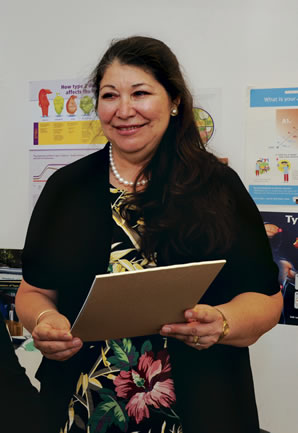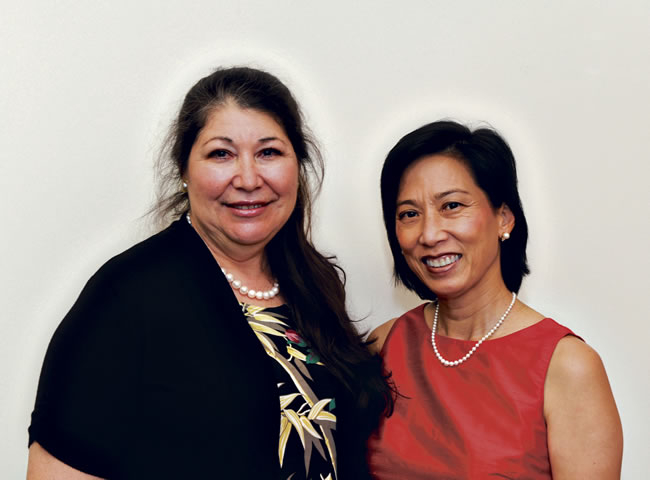Help In Managing Diabetes
Viola Genadio
Co-director of TCOYD Diabetes Conference and Health Fair
It’s estimated that 415 million people globally suffer from diabetes and need to get Diabetes Treatment in Dubai or wherever in the world they’re from. This is a huge number that just goes to show how important centers that help manage people’s diabetes are because, without them, a lot more people would be suffering from the severe effects of diabetes.
Where did you receive your schooling/training?
My bachelor’s in nursing is from California State University, Los Angeles. My master’s is from Southern Illinois University.
How long have you been practicing?
I have been a nurse since 1979. When I came back to Hawaii in 1990, I worked for St. Francis Medical Center until it was sold and renamed Hawaii Medical Center. I remained with HMC until it was shut down last December.
Viola Genadio and Dr. Laurie Tom
What is your background in diabetes care?
I have worked in critical care and emergency room nursing, but when I came back to Hawaii, St. Francis Medical Center-West was going to open. I was hired as the nursing staff development coordinator and started its education department. In 1995, I became the nurse coordinator for the new Diabetes Center at St. Francis in Liliha. I have been a certified diabetes educator since 1995, and am also board certified in advanced diabetes management since 2001. I was Hawaii’s 1999 Diabetes Educator of the Year and am a member of the American Diabetes Association and the American Association of Diabetes Educators.
What are some of the lifelong struggles diabetics face?
It can be a struggle for people with diabetes to make its care a part of your life instead of having it take over your life. They must learn how to check their blood sugar and what to do with the results, and must manage physical activity, medications, regular eye and foot exams, and eating the right foods. Learning as much as you can about your diabetes helps you become proactive. Prevention is the key. People with diabetes can do all the right things and still experience long-term complications. Cardiovascular health is a major concern because people with diabetes may have other health problems such as high cholesterol and high blood pressure. If those are not handled, they can lead to, for example, kidney failure and blindness.
You are a co-director of the Taking Control of Your Diabetes (TCOYD) Conference and Health Fair coming up April 14. What can visitors expect?
It is a motivational and educational conference. Dr. Steven Edelman is the founder of TCOYD, a 501(c)3 based in San Diego, and the director of the TCOYD Conference and Health Fairs. He is an endocrinologist and has had Type 1 diabetes since the age of 15. TCOYD first came to Hawaii 12 years ago. The conference is popular because the cost is fairly low, it is all day, there are speakers from various backgrounds, and it is upbeat. It is not only for persons with diabetes, but also for their families and friends. Conference attendees also can receive one-onone advice from endocrinologists, diabetes educators, dietitians and pharmacists, and the Health Fair offers a variety of exhibitors.
The conference is at the Hawaii Convention Center from 9 a.m. to 5 p.m.. Cost is $15 per person, $10 per person when two or more people register together. For more information, visit tcoyd.org.
Who tends to be at risk?
Every 17 seconds, someone is diagnosed with diabetes in the U.S. Certain ethnic groups tend to be more at risk for developing Type 2 diabetes. In 2009 an estimated 113,000 people in Hawaii had diabetes, of which 28,000 remained undiagnosed. Native Hawaiians have the highest mortality rates, followed by Filipinos and Japanese. Diabetes tends to run in families. You also can be at risk if you are overweight, have a history of high blood pressure, or are not physically active. People also can be diagnosed as having pre-diabetes, meaning they are at risk for developing the disease. That is an area where research is being done toward making a difference by slowing down the progression or trying to prevent it from occurring. The focus is on diet and exercise since both play an important role. The American Diabetes Association has a tool, a test you can take, to see if you are at risk for Type 2 diabetes, the most common type. You can go to the American Diabetes Association website (diabetes.org) to take the Diabetes Risk Test or call the local office at 947-5979.
Is it inevitable that diabetics end up with severe problems like kidney failure or blindness?
Diabetes may increase your risk for serious problems such as kidney failure, blindness, stroke and heart attack. With the correct treatment and lifestyle changes, however, many people with diabetes are able to prevent or delay complications. Once you are diagnosed with diabetes there is no cure, but you can manage and control your disease.







